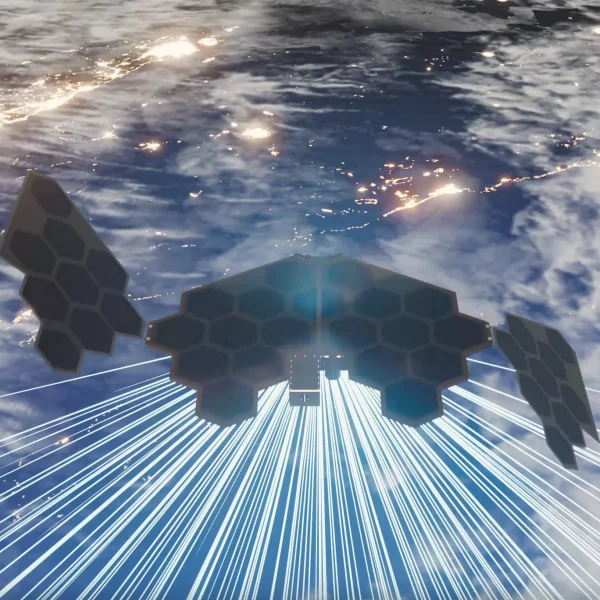SpinLaunch Prep 2Tbps LEO Satellite Broadband Network – Meridian Space

The company responsible for developing a system of sending micro-satellites up into orbit by using a massive centrifuge instead of rockets, SpinLaunch, has partnered with Kongsberg Defence & Aerospace to help it separately develop a new global network of highly compact ultrafast broadband satellites – called ‘Meridian Space‘ – for Low Earth Orbit (LEO).
The initial network is expected to consist of around 250 microsatellites (minimum required for them to achieve global coverage), each of which will weigh about 70kg and harness the latest 5G based NTN (Non-Terrestrial Network) protocols for wide compatibility. This should deliver a sellable global capacity of over 2Tbps (Terabits per second), focused on serving businesses (backhaul for mobile networks, maritime, corporations, aviation etc.).
According to the website, each satellite will feature a number of innovative features, such as a reconfigurable reflectarray antenna that’s highly compact and operates across multiple frequency bands. The satellites also act more as relays for ground stations using “bent-pipe” architecture, which means that the signal processing will all be done on the ground (not onboard the satellites), thus reducing complexity, size and power requirements.
Advertisement
In addition, each satellite will adopt fixed-track orbits, which should help to simplify the setup and design of ground-based user terminals and gateways (i.e. no need for complex tracking antennas). The result is a lightweight satellite that’s cheap to build and can be deployed at scale via a single rocket launch (SpinLaunch won’t be using their centrifuge system for these, at least not yet).
The initial plan is to deploy a number of test satellites as part of an In-Orbit Demonstrator (IOD) mission planned for sometime in 2026, but if all goes well then a single rocket launch could conceivably allow the first customer links to go live in that same year. But we’d caution that space related programmes often suffer delays, so 2027 may be more realistic.
Assuming all goes well, the constellation could eventually be expanded to contain at least 1,200 micro satellites, but that will be a few more years down the road. In any case, this may help to provide yet more competition for SpaceX’s otherwise fairly dominant Starlink network, while also putting pressure on OneWeb (Eutelsat) and Amazon (Project Kuiper), although SpinLaunch aren’t themselves going to be offering direct consumer broadband services.
One to watch.
Advertisement
Mark is a professional technology writer, IT consultant and computer engineer from Dorset (England), he also founded ISPreview in 1999 and enjoys analysing the latest telecoms and broadband developments. Find me on X (Twitter), Mastodon, Facebook, BlueSky, Threads.net and Linkedin.






















































More speak today . . . fry tomorrow:-
https://www.youtube.com/watch?v=P29F7LAtqzc
“n April 2025 after a long hiatus, the company announced a plan to develop a communications satellite constellation called Meridian consisting of 280 satellites, but they would be launched via conventional chemical rockets”
wikipedia